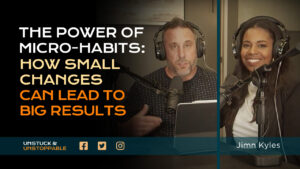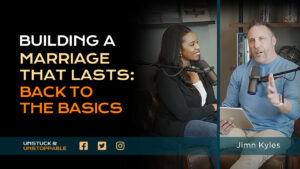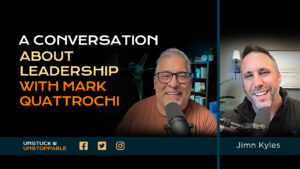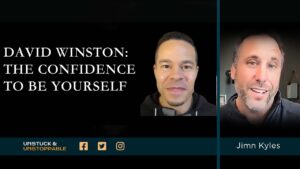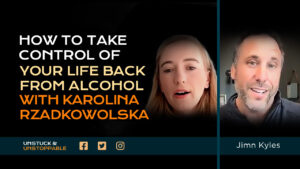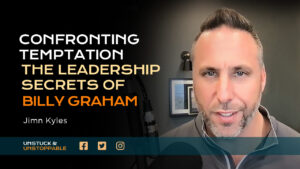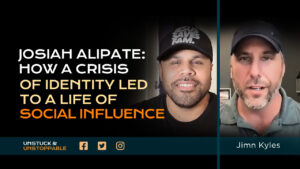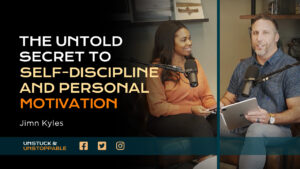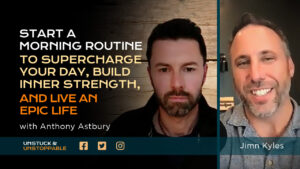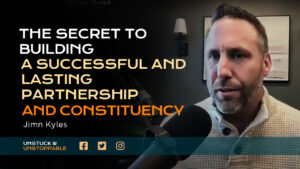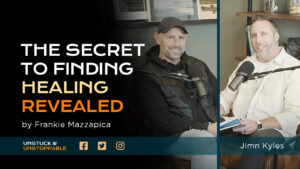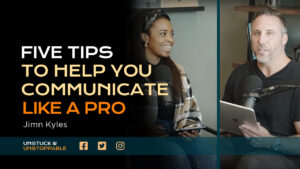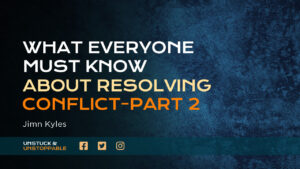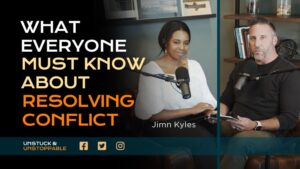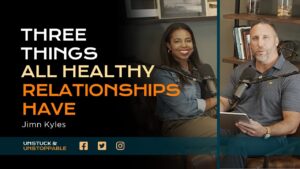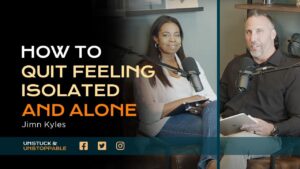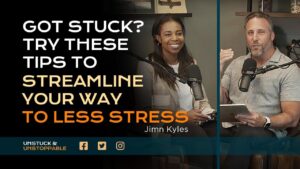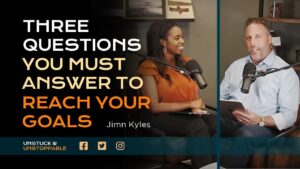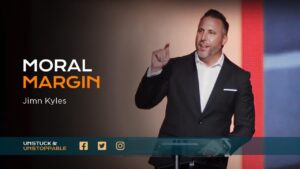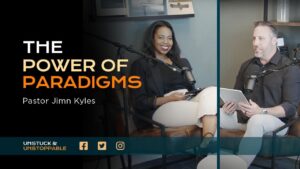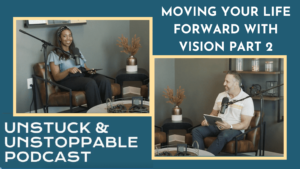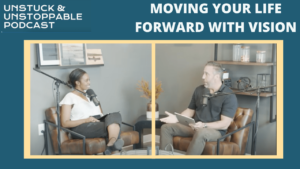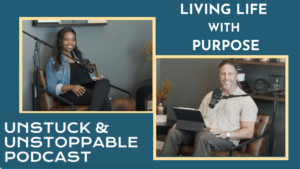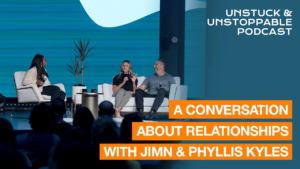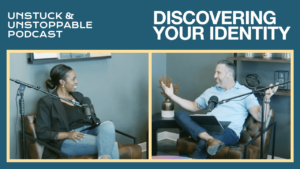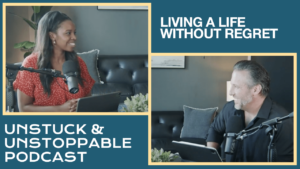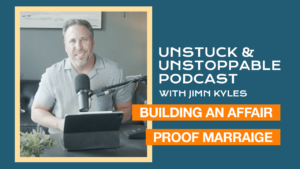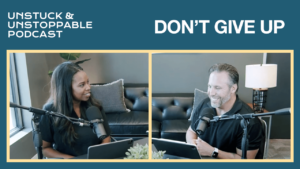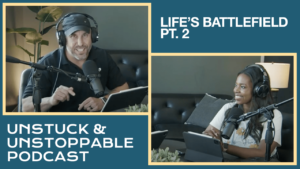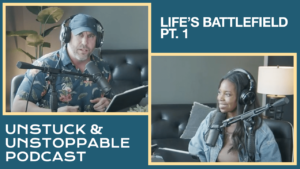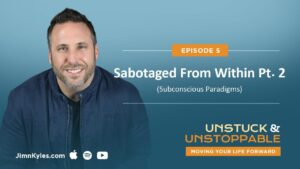022: What Everyone Must Know About Resolving Conflict
Our whole goal is to help you get unstuck and become unstoppable. For the next two weeks, we will discuss Conflict and today’s episode is the first part of this series. Stay tuned as we discuss the three root causes of conflict.
Order your copy of “Unstuck and Unstoppable” here –www.jimnkyles.com
Join our email newsletter and get the first three chapters of my book for FREE (Ch. 1 – Help, I’m Stuck, Ch2 – When Life Bites You, Ch3 – Don’t Settle Where You Are) Click this link to download now – https://pages.jimnkyles.com/bookpreview
Website- www.jimnkyles.com
For access to Spotify, Apple Podcast, GooglePlay click: https://kite.link/Episode-22
Connect with Jimn
Instagram – https://www.instagram.com/jimnkyles
LinkedIn – https://www.linkedin.com/in/jimnkyles/
Facebook: https://web.facebook.com/jimn.kyles?_rdc=1&_rdr
#unstuck #unstoppable #unstuckandunstoppable #unstuckandunstoppablepodcast #jimnkyles #SelfCare #selfcarematters #SelfCareIsHealthcare #selfcarebook #selfcarefirst #getunstuck #getunstucknow #getunstuckbeunstoppable #leadwell #leadwellservewell#moveyourlifeforward #moveyourlifeforwardnow #moveyourlifeforwardonpurpose #moveforward #moveforwardtogether #moveforwardinfaith #leadership #leadershipdevelopment #leadershipskills
Jimn Kyles 0:00
Welcome to the unstuck and unstoppable podcast where we help you move your life forward. If you’ve ever found yourself experiencing conflict in a relationship and do not know how to resolve it, you’re listening to the right episode of our podcast today. My name is Jimn kyles. I’m your host, and I’m here with Jolea Garza. Hey, hey, yeah, we’re doing great. Come on. Great. It’s been great fall weather
Jolea Garza 0:24
in my fall clothes. You’re watching. We’re in Texas, and we don’t get very many minutes. And so I was just laughing. Wearing sweaters and jackets and jackets and everything
Jimn Kyles 0:35
so funny here in Texas, the degrees can change by 20 and 30 degrees. In a day in a day, you get up your long sleeves right sleeves in a jacket of a jacket, by the end of the day. You sweat. Yeah.
Jolea Garza 0:46
Like, we gotta you have to dress in layers. That’s the thing layers.
Jimn Kyles 0:49
Yes. Right. Well, hey, we are so thrilled to have you join us. If you’re watching online. Hello. We’re glad to see you on YouTube. If you’re listening to the podcast, wherever it is that you consume podcasts. We are so delighted to have you join us. Today we have a great topic. We are talking about how to resolve conflict. Yes. And it’s a part two of this episode from last week, right? Where what we actually talked about was the root cause, which was great of conflict. Yeah. But
Jolea Garza 1:17
I’m really excited about today, because now we know the root, we’re going to help you solve it.
Jimn Kyles 1:21
That’s right. So we had some things we talked about what causes that it’s really there are some roots to conflict. And so if you missed it go back, I want to encourage you to go back and listen to it. And if you listen to it, you should be here today, actually, with some homework you’ve completed, we had a couple of things that we wanted to do, number one, identify the relationships in your life where you’re experiencing conflict. And then the second thing is that you would evaluate the core reason as to why you think you’re experiencing con. Absolutely. And so hopefully you came ready, you’re like, Hey, I’m ready. I’ve identified I’ve evaluate. Here’s one of the core reasons possibly. And then now today, we’re going to talk about really how to resolve conflict. And you can Google this, there’s lots of ideas and thoughts, we’re just going to give you four things that, you know, for us we actually use on a regular basis, especially leading a staff and a team and a church.
Jolea Garza 2:15
That’s helpful that we use, you know, I think that even for me, personally, a long time I used to avoid conflict, you know, I didn’t want to have any conflict. So, so this has been really great. These are tools that you know, that we’ve talked through that we’ve used to to have healthy confrontation, healthy conflict that allows everybody to get better on the other side.
Jimn Kyles 2:36
Well, let’s start off with this question. If you’re just joining us in this, you know, part one, part two, it’s okay, keep listening. But the first thing we got to ask is, is conflict normal.
Jolea Garza 2:45
Yes, conflict is great. It’s awesome. It’s awesome. Yeah. You don’t grow without conflict. Yeah, yeah, I that’s exactly what I was saying is I used to avoid it. Because I thought that only unhealthy people only toxic people always have conflict. If you grew up watching Maury, it’s like, oh my gosh. Like only those kinds of people get advices. Like, no, it’s normal for us to have conflict. That’s right conflict to get better
Jimn Kyles 3:11
conflict is healthy. Yes. In fact, it’s, I would be concerned if I’ve got a relationship that I say is a great thriving, valuable relationships and never have experienced conflict. Yeah, yeah. Conflict gives us lots of, you know, teaches us so much and gives us skills that otherwise we wouldn’t have, like, we have to learn to listen to the other person. We have to learn to compromise. Yeah.
Jolea Garza 3:32
And then it opens our minds to new ideas, new ideas, new ways of thinking, new ways to live when you have conflict. That’s right.
Jimn Kyles 3:39
And so in a healthy way, conflict is good. Now, we also have been in those situations, and I’m sure everybody has experienced where you just get vomited on when someone just tells you off. Yeah, that’s not what we’re talking about. That’s a that’s an emotional moment of anger and frustration. And many times that’s in maturity. It’s, there’s so many different things we could label with it. But what we’re trying to say, trying to say that was my country. What we’re trying to say is there’s a healthy way to express frustration, and then to resolve it. Yeah, no, and here’s why is it some conflict, there is going to be a resolution? Yes. Like, hey, if I stopped doing this, then that resolves the conflict, but some of it is attention to be matched. Yeah.
Jolea Garza 4:26
And sometimes it really will just stay attention, but having to talk about it. I just want to say, you know, before we dive into the different ways, it’s okay to not get this perfect. The first time resolving conflict is a lifetime of finding healthy ways to do it. And I would just say, as you’re listening to this podcast, just commit to getting better at conflict, commit to trying to master the art of conflict, but it’s a lifetime process. And we’re all imperfect people we all have lots of emotions. And so dealing with Conflict is always going to be, you know, intricate and different in every scenario.
Jimn Kyles 5:04
And I think the key to that too is when people see your heart. And as long as you’re constantly just displaying your heart, man, oh, man, I got that wrong. I’m so sorry. But I’m gonna work on this. There’s a lot of grace, we get to see a person’s heart. There’s four things, though, we thought, here’s just four things that we believe we’re going to help you the first one, you need to evaluate the relationship. And what we mean by that is, is this a relationship that’s worth even having a confrontation with? And resolving the conflict with like, do I go in and try to resolve my frustration?
Jolea Garza 5:36
Yeah, it’s like you’re walking in the grocery store, somebody passes by you, they give you an ugly look? Are you gonna chase that person down and be like, No, sit down? We’re resolving the result. Right now. You hurt?
Jimn Kyles 5:47
Yeah. So and there’s so many relationships, I think if we’re not careful, we’re trying to make an investment in because that’s what really resolving conflict is an investment into this, this relationship into relationship that really, it’s not, it’s not going to be reciprocated, or it’s just, that’s not what we want to do. We want to find the relationships where, hey, it’s worth me trying to resolve this conflict. And so you know, like your spouse, right? I mean, that’s definitely worth it. Your kids or your extended family, best friends, close friends, friends, co workers, and even co workers. There’s different levels, right? Because if you’re talking about a person that lives that works in a department that I never see, but they were at the Christmas party, and they frustrated me and now with them. And I’m gonna go and make them listen to what they did and how they made me. I mean, not necessarily not necessary, because they don’t they’re not emotionally or relationally connected or even invested in this. And it’s just, you’re just wasting your energy. Yeah, so the key is, let’s find the relationships that hey, I’m gonna make an investment in resolving whatever the conflict is. Yeah, because it’s worth it’s so
Jolea Garza 7:00
funny. It’s like choose the relationships that are worth fighting for. So you know, I hear you’re avoidant. Sometimes we just, you know, avoid the conflict and don’t want to have have, you know, any engagement with anybody. But if, like, if this relationship is worth fighting for, it’s worth
Jimn Kyles 7:16
it. Yeah. Absolute second thing is, I will address the issue, not avoid the conflict. Now, this is a choice that you got to make. Yeah. And this is really the foundation of look, I choose to address this issue, because it’s not going away. Yes. But what ends up happening is the relationship secretly erodes from your heart and you get angrier and angrier and angrier. They don’t even know it sometimes.
Jolea Garza 7:42
So I think it’s a lot of times it’s easier. And it depends on your personality type, too. I will say. There’s some people who are called avoiders. So if you’re an avoider, you’re like I don’t, I don’t want to have a conversation at all. But what happens is, even if you don’t have the conversation, everything looks good on the surface, the offense is still there, and it’s lingering, and it’s festering, and so the longer you don’t have the conversation, every time that person does something else, and they could have no intention of hurting you anymore, you are keeping tally marks and you’re becoming more and right than Dallas,
Jimn Kyles 8:19
offended, frustrated, and then what happens is, you explode. All
Jolea Garza 8:23
right, you turn around Sunday. Yeah, they’re like, What in the world?
Jimn Kyles 8:28
Well, and I thought about that, how do you do it? Well, if I’m gonna address the issue, you got to set aside time to have the meeting. Yes. So we always talk about it’s not real, unless it’s in the calendar. And so just say, Hey, can I have 15 minutes of your time, right? 30 minutes of your time, and just set aside whether it’s your spouse, your kids, I mean, whatever it is, but don’t let it happen. Here’s what I’ve seen. That is ineffective. And what I’ve done, confrontation or trying to resolve a conflict happens in passing. Like, you’re passing by, Hey, I just wanted you to know, you heard the other day, you hurt my feelings. And this, I felt frustrated, you didn’t invite me to the and it all happened in passing? Well, you gotta remember that they’re thinking about a million different things. Their mindset is in a different way. And now you just it’s not gonna be productive, right? 100 So I’m gonna set aside time and
Jolea Garza 9:16
sit down and sit down rotation. Yeah, don’t let time pack too much time pass. That’s right. Yeah. Now, a couple of days. I think it’s good to maybe take some time to process what you’re feeling to process what happened and then bring it up. But But don’t let a month or two go by and turn back around and be like, I’m upset with you because you’ve hurt me, you know, you know, a year and a half ago, so you’re not?
Jimn Kyles 9:37
Yeah, when I was thinking a great example would be even you know, if you work at a company or an organization, and you’re part of a team, but every time your boss, it just seems like you get bombarded last minute with information you feel like there’s no or little communication to you or to your department. There may be little lag or there may be a lack of clarity on what your responsibilities are what’s expected. What happens is, as an employee, you just sit there and go week after week, and then all of a sudden, you’re just like, I’m done. You just call your boss and say, Hey, listen, can we just have a few moments? There? There are some things that I’d like to just try to get resolved, feeling some frustration. And here’s a great way. I don’t feel like it’s your heart. I don’t think it’s your heart. But I’m asking if you could just meet with me. So we can talk through it.
Jolea Garza 10:28
Right? Absolutely. And I will say not every single teeny tiny issue needs to be addressed all the time. Sometimes you have to be introspective, you know, and take a second and say, am I just being, you know, not overly sensitive, but maybe it’s just just this just trigger me for some reason? Or really, is there a piece of ownership that needs to go to a different party that I need to address and talk
Jimn Kyles 10:50
it through? I mean, with the spouse with with all of it, like, Hey, who’s picking up the kids or dinner or taking out the trash? You know, that’s one of the things when I counsel young people who are about to get married, I take this whole assessment test. And it’s amazing to me, how that the basic question of, hey, whose responsibility is trash? Right? How many kids do you want, you know, just who’s going to tuck the kids in for bed? You know, those are pain points that can begin to build conflict in a marriage, that if we don’t just sit down and talk about like, Hey, listen, there’s, I’m feeling this, I’m sensing this, can we get some clarity? Can we get some, you know, some, some conversation around this. It those simple things sound very little bit. It’s interesting married couples who come in and end up with counseling. And you’ll know this as well. A lot of times their issues started, because they didn’t confront each other on a place where there’s pain or there’s frustration, right, right. And a little thing over alone, time becomes a big thing. Yes, we’re saying, hey, look, if this relationship is worth investing in, we’re not going to let little things be big things. Absolutely. We’re just gonna go ahead and start talking about it. That’s great. Especially if the ownership of that really may fall on the way there, you know, either communicating, not communicating doing or not doing something where you feel like that.
Jolea Garza 12:06
Yeah, yeah, just don’t just don’t let it fester. I think about you know, if you get a dead road, you know, somewhere in trashcan or something like that, if it dies, and you catch it immediately, and you get it out of wherever it is, it’s okay. But if you let it sit, it will stink up the entire environment. That’s what happens in relationships, when we lead a fence it it just, it starts to
Jimn Kyles 12:27
mess up. The entire relationship. Yeah, that’s awesome. Here’s the third thing, I will respond and not react. So you know, when we talk about conflict, when we talk about resolving it, many times, when you feel escalated, you’re in a conversation. They’re escalated, or you’re escalated, we’re saying, hey, the I’m gonna choose to respond and not react. So this may not be the place nor the time, to address the root of this conflict, to try to resolve it. Because it can be very unproductive. If we’re escalated. A lot of times what will happen is we react out of anger, frustration, it’s very emotionally driven. There’s usually a lot of aggression, and then it ends up fueling disagreements and division.
Jolea Garza 13:16
Yeah. And oftentimes, when you’re reacting, you’re not looking for solutions. Like when we’re resolving conflict, trying to hear your perspective, I really don’t care about if I’m yelling, and I’m emotional, like, I don’t care about, you know, us finding a solution, I just want to get my point across, right. So that’s why we’re saying instead of reacting instead of, instead of it being emotionally driven, that you just take time to respond. Responding is a lot calmer.
Jimn Kyles 13:47
How many times have we have you reacted? Let me just say, I reacted. The relationship has hurt. And I gotta go back and apologize. And man up just learning the older I get is like, just shut your mouth. Yeah, hold on, listen, and then just say, Hey, can we just come back and revisit this? And that’s the respond, right? Right. Because responding gives us the ability to let our emotions dissipate and my emotions are going to be less than what they are now and I just have a second to breathe really, I would say if you get escalated, according to studies you should not continue the conversation for at least 20 minutes Yeah, it takes 20 minutes to lower your heart rate to cause yourself to calm down cool down and then you can say okay, let’s let’s talk about it, but I’m gonna do it in a way that is an understanding empathetic, conversational way right? That really advances the relationship not hinders or deteriorates,
Jolea Garza 14:47
well thought out. I even love you know, in and having healthy, healthy conflict. You want to ask great questions, too. So so as you’re having that conversation, maybe you do maybe it starts, you know, a little bit heated. Take 20 minutes Just say, Hey, we’re gonna pause. That’s right, 20 minutes, because I want to solve this issue because your relationship is important to me. Let’s take 20 minutes, let’s come back. And then as you’re having that conversation, not only have you thought through now, some of the things that you want to say, but then you can ask questions. And when I heard you say that, what did you mean? Or, or here’s what I’m hearing you communicate to me now, this is how I feel about the situation,
Jimn Kyles 15:26
what I found a lot of the conflict and challenges even that I’ve had is because I see their actions, not people’s intentions. And so asking those questions, many times when you get more information, it actually solve some of the conflict going on inside of you, because you got a different perspective. You realize, oh, they didn’t mean that intentionally. They didn’t. And I think that goes to the fourth thing about part of resolving conflict, is that I will focus on the good and not the bad. Yep. You know, how many relationships do we have where 80 to 90% of what happens is really good, right? And there’s only about 10% 20% That is rough or needs real work on. And yet, if you’re like me, I find myself focusing on the 10 or 20, or five or 2%. Yeah. And then it drives this negative narrative narrative.
Jolea Garza 16:25
Right. So you say a great quote, and you’ve, you’ve spoken about it multiple times, but it’s, we judge people based on their action. And we want others to judge us based on our intention. Oh, good. And, you know, the truth is, if we would judge people based on their intention, you know, and be open to think, man, the way they said that, or man, they left the kitchen a mess, you know, and just thought, but what about their intentions for you know, maybe they had good intentions and trust it, that their intentions are good, that would help 100?
Jimn Kyles 16:55
Well, you’re in the relationship, right? So the relationship, you know, again, they’re, they’re wanting the best for you, you know, co workers. Maybe you can feel like, well, I don’t know. But if you assume the best, yeah, it really impacts your whole filter in the way that you experience things. But if you’re constantly feeling like, what they’re just out to get me, they don’t like me. Well, everything they do is judged in a negative light. And there’s just no way to resolve conflict, because the conflict is not in them. The conflict is in you. Yeah.
Jolea Garza 17:27
And it’s how it’s in how you’re receiving every single thing that they do.
Jimn Kyles 17:31
And that goes back to where you’ve got to learn to be healthy and say, Okay, God, how do I get healthier, and really shift my paradigm? Because a lot of times we have that perspective, because of past trauma. Maybe you were in a relationship, or maybe you were at a job. And that person really did well have something, you know, in for you that were that were mean to you? Or ulterior motive. Yeah. But if you’re not careful, you’ll judge every relationship. Yes. Hereafter based on one person, instead of saying, No, that was just a one off. That was someone that’s not a normal relationship. And I choose to believe the best and not the worst. And I love what Andy Stanley said, I learned this years ago, it was his podcast. But he talked about the idea of filling in the gap with trust.
Jolea Garza 18:21
Not suspicious. So good. I live based off of that idea. So tell us about it. So yeah, so you just choose to trust you choose that everybody has their your best interests at heart. Everybody wants the best for you. Versus suspicion, which is just assuming that that people want the worst for you that they don’t have your best interest at heart.
Jimn Kyles 18:40
Yeah, I was thinking even a practical thing. It happened the other day, I was talking to someone. Well, first off, we were in a meeting and someone showed up late, and it really bothers me. Yeah. And people are late, because I feel like you’re not only wasting my time, but you’re wasting everybody’s time in the meeting. Well, I didn’t say anything and didn’t say that all and I’m thinking man, well, the first thought is, man, I can’t believe they’re late, right? But then the second thought was, hey, I’m not going to believe the worst, I’m gonna believe the best. I’m sure there’s a reason. And then you go back and you say, Hey, man, I noticed you were you were late to the meeting. Is everything okay? And come to find out there was a real situation as to why, in fact, they were counseling someone in a very dire situation. And so it’s the fact of saying, No, I’m gonna believe the best and, and I’d say nine times out of 10,
Jolea Garza 19:33
their risk tradition was good. And the sad thing is that that what people will usually do in that situation, because you don’t think to hey, let me choose trust, let me choose to trust, then we just go off with our own assumption. And so you could have sat with that, oh, he was late and he just doesn’t value my time. And you could have sat with that and been there and been angry and
Jimn Kyles 19:53
there was a day if I’m honest, were candid, which I’m always on but if there was a day when I was candid there years ago, I would have thought that Negative and just let it sit, you just sit and fester, and then you’re frustrated, then you and then it shows up in your actions and your words, and then you go back and you’ve damaged a relationship. And then when you find out later, it’s like, man, wow, it wasn’t even the case or the situation. Yeah. You know, so there’s got to be this thing of man, I choose to believe the best. And as you do, it’s amazing how it really does help you absolutely get in the right position and posture for conflict resolution. Yes, yeah. Yeah. Well, that’s great. So tell me so what if you were to say conflict, and resolving conflict was a charge you would tell people listening right now? What would you say?
Jolea Garza 20:41
I just say, try, try, try, try your hardest to take some of these and really implement them. You know, specifically, I would, I would just say, the React or the respond and not react is a big one. You know, and even choosing to address situations, I would say, a lot of times we’ve just seen, and we see it all the time where offense has just been let left to just sit and fester and relationships are broken and hurt, because nobody is willing to just address the issue to talk through it to sit down to have the conversation. And and conflict and confrontation is hard. But it is worth it. When you have people and relationships and spouses and co workers that that you want to do life with that you want to go far in this life with
Jimn Kyles 21:27
Absolutely, well, that’s such a great charge. And I would challenge you to if you’re listening right now, identify the relationship that you have the greatest amount of conflict in right now. And just focus on that sometimes it can be very overwhelming, to say, Well, I feel conflict, and what’s the biggest relationship that if you focused on would bring the greatest impact or result. And then just focus on that just just focus on one at a time, you’re not going to get it right all the time. Keep letting them see your heart. And I’m excited to hear the stories of you here. If you have a story of how you’re gonna work through some conflict, just send us an email. The information is in the description of the podcast. Also, if you want more content, free things, sign up for our email newsletter, we the link is in the description of the podcast. We regularly send out free things absolutely. People that have subscribed to the newsletter. And so we’d love to keep you updated with what’s going on. send you some great free stuff, resources, articles, interviews, ebooks, all of that we send out and so check it out. We’d love to hear from you and then have you join us. Well, we can’t wait to be back with you next week. So until then, keep step stepping your life folks. Bye bye
